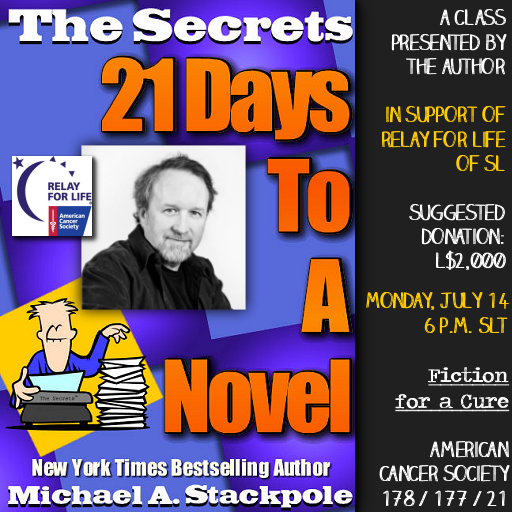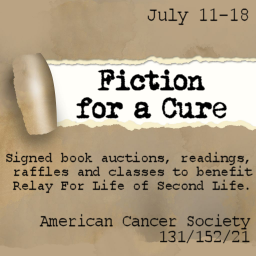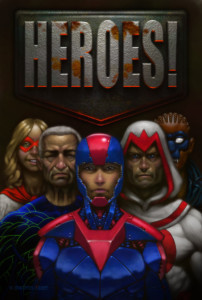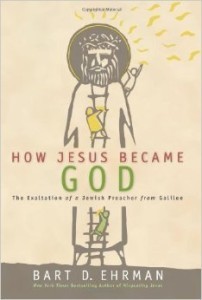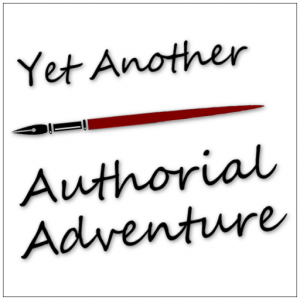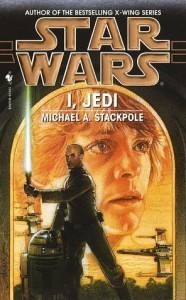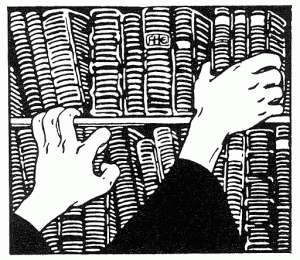Michael A. Stackpole's Blog, page 3
July 14, 2014
21 Days to a Novel: Tonight in Second Life for FFAC
Tonight, starting at 6 PM PDT, I’ll be teaching my class, 21 Days to a Novel in Second Life. The event is part of Fiction For A Cure, which is part of Relay for Life in Second Life’s cancer research fundraising effort for the American Cancer society.
Hit the link for information about the class this evening, then look at the schedule for a list of other things we’re doing during the week. You might also want to check the Live Auction items and the Silent Auction items. Lots of great authors, like Stephen R. Donaldson and Diana Gabaldon, have donated signed books for our auctions.
If you’d just like to donate without coming into Second Life, you can do so by hitting this link to our direct donation page. Thanks for reading, and thanks for your support.
July 11, 2014
Fiction For A Cure
Fiction For a Cure is a Second Life fund-raising event, which is part of the American Cancer Society’s Relay for Life campaign. Kat Klaybourne and I have organized the event, which features live and silent auctions, classes, readings and raffles. Kat reached out to donors and sponsors on the Second Life side of things, and I asked a favor of my writer friends. As a result, we have a stellar lineup of creative talent who have offered rare and unique prizes.
Seriously, please hit the Fiction For A Cure link. I’ll wait. (I’ve even made it open a separate window for you.) Take a look at the donor sidebars. We’ve over thirty authors who donated books, games and/or really cool opportunities for you to get written into a story. To be quite frank, the response and generosity of responses has been a bit overwhelming. But that means it’s your chance to get your hands on some very rare and wonderful material.
In addition to the auctions, we’ll have classes and readings. I want to point out that on 14 July at 6 PM California time, I’ll be offering my class 21 Days To A Novel. If you’ve ever had an interest in taking the class, but couldn’t make it to one of the conventions where its offered, this is your chance. The donation we’re asking works out to roughly what you’d pay at Gencon or DragonCon.
Here’s a link so you can read up on getting started in Second Life. It’s a lot of fun, and I hold weekly chats there.
If you can’t make it in, or would just like to donate to the Fiction For a Cure event, you can hit this link to contribute.
This is going to be a really cool series of events. I know we’ll have more things to announce, and I’ll get info out on as timely a basis as I can manage. Check back here for more word, and thanks for your help.
July 9, 2014
Amazon’s Offer to Authors: a reality check
Amazon floated a trial balloon in their dispute with Hachette to “take authors out of the middle.” Gigaom.com has the full text here. Within minutes of the letter’s publication, warriors on either side of the fight decried the letter as a cynical PR ploy, or praised it as proof that Amazon truly is sympathetic to authors.
Here’s the operational portion of the letter:
• If Hachette agrees, for as long as this dispute lasts, Hachette authors would get 100% of the sales price of every Hachette e-book we sell. Both Amazon and Hachette would forego all revenue and profit from the sale of every e-book until an agreement is reached.
Amazon goes on to offer a series of concessions to Hachette that amount to a return to status-quo ante while they are negotiating. All in all it looks like a fantastic offer that will benefit authors.
And it’s an offer that Hachette will never agree to. Here’s why:
1) Hachette, in its corporate state of enlightenment, has decided on a course of action in its negotiation with Amazon. They seem content to hold firm. For better or worse, that is their position and they don’t seem inclined to budge off it.
2) For Hachette to accept that offer it would require Hachette to modify clauses in contracts with tens of thousands of authors, agents and author estates. That alone is costly enough that their legal department has to be screaming “No!” at the top of their lungs. Add to that the potential of some authors to hold out for further modifications of ebook clauses or going public with the news that Hachette isn’t allowing them to accept Amazon’s offer, and this is just a PR nightmare for Hachette.
Hachette’s accounting division would also have to come on board, and that portion of most publishing houses is extremely slow to move. (Kinda like Brazil’s defense against Germany.) That’s just a non-starter.
3) I have no doubt that folks on the publishing side of the equation see this tactic as being close to extortion. We know Amazon will be negotiating with other members of the Big Five in the future, and not a one of them wants to see Hachette cave to an offer like this. Moreover, Hachette can look to a return to this tactic next time contracts come up for renewal. No corporation would open themselves to that kind of strategy.
The real question is this, “How good an offer is this for authors?” That would depend on how many ebooks the author sells, clearly. But most folks don’t understand how payment for books work.
If Hachette were to accept this offer starting today, few, if any, authors would see a dime until 1 April 2015.
We’re in the second half of the year, so all sales from July to December are totaled together, and then checks are written for the appropriate amount of royalty money in April. That’s how archaic the publishing world’s accounting system is. While this offer seems like a boon to authors, it is not immediate financial relief. It would be a windfall in April, but that’s the earliest anyone would see money.
(Yes, Hachette could pass the money immediately through, but that would go back to contract modification, which they’re not going to do. Plus, having showed that they don’t need three months to calculate royalties and deliver payments, they’d be on the hot seat for not modernizing across the board.)
Curiously enough, Amazon has in its power the ability to win all authors onto their side in this dispute. What they would have to do is simple, and wouldn’t cost them nearly as much as their offer to Hachette would.
1) For all ebook sales, create a super-sweet-spot of pricing. For any ebooks priced between $4.99 and $6.99, the author will receive 85% of the cover price.
2) Drop the payment schedule from Net-60 to Net-30, getting money to authors faster.
In one fell swoop they’d be able to drift ebook prices upward on average, and yet keep them in the price range they’ve long tried to promote. The Net-30 aspect means that authors would even more immediately feel the effect of their self-published work on their economic bottom-line. That will encourage them to do more independent publishing, and Amazon is clearly the leader in that market.
As I noted in my previous post, I’m not taking sides in this fight. The comments above are meant to clarify a situation by pointing out economic and contract realities. While the offer, if accepted, would be wonderful for Hachette authors—and I wish Barnes & Noble had offered it in the summer of 2014 when their pissing match with Simon and Schuster meant B&N stocked 1 (one) copy of my World of Warcraft™ novel in each store when it was released—the benefit would only appear in April, not immediately.
July 7, 2014
Backing the Wrong Horse: Why choosing sides in the Amazon—Hachette feud is a moron’s choice for writers.
Let me state at the outset that the following is likely to outrage writers and publishers. Those who deign to comment will dismiss me as being ignorant or mistaken or secretly in agreement with the “other side.” I want to be clear: the “side” I’m taking in this discussion is mine and mine alone. I’m in business. The only person who will look out for my interests is me. The same is true for any business—Amazon, Hachette, Apple, the rest of the Big Five included. To assume, especially in this environment, that anyone has your best interest at heart (aside from yourself) is delusion.
Why are writers being foolish in picking sides here? Consider the following:
1) A writer is the least important part of the book selling eco-system.
Sure, read that again. You’re thinking, “But without writers, how do they get the stuff they sell?” The problem with your question is that you miss the answer—which you’ve buried in your question. Publishers don’t need writers, they need product. If they needed real writers, James Patterson, Snooki and any other ghosted celebrity author would never have a book appear on a shelf.
Any one writer, myself included, is expendable. And as the explosion of RAW work proves, for every one writer working today, there are five thousand or so souls eager to take our places. Heck, in teaching classes at conventions like DragonCon, I’ve trained thousands to take my place. Any one writer has plenty of competition, and the law of averages suggests that at least one of them is going to be just as talented as the writer they replace.
Moreover, and here’s the really scary part, the desire for validation—the desire to have an authority figure choose your writing as worthy of publication and promotion—is so fierce, that many authors will accept incredibly crappy deals, just so they can be “living the dream.” This means that publishers have zero incentive or need to be making better deals with beginning authors.
2) Publishers feed popular tastes, they do not set them.
Publishers are reactive, not active, when it comes to delivering work. In my publishing career, there have been three trends which have died horrible deaths. Technothrillers became a thing when Ronald Reagan read a Tom Clancy book. Cyberpunk became a thing because Bladerunner. Horror blossomed with Stephen King. All three of these trends blew up, became huge, then collapsed under their own weight.
Publishers bring out a limited number of books per month. If something gets hot, like paranormal romance, it starts getting more slots in the monthly schedule. This extra demand for books means that editors still get to choose the Grade A books that come in, but have to fill in with B and C grade books. A glut of mediocre books leaves readers unsure of what they’re going to get for their money. This, in combination with the fact that no one could afford to buy all the books in any fad, means sales slump. Once sales start to slump, publishers cut their losses, eat the advances on unpublished novels, and start looking for the next fad.
And woe be unto any of the authors whose mediocre skills earned them massive advances just because their subject area was hot. Publishers will remember that author as owing them money and that career will be dead. This, even though the debt was created by the publisher’s irresponsible spending in the first place. (Self-interest, as mentioned above.)
Because publishers react, they buy in the now, not looking at the future. Return on investment is what is good for the business this month, not what is good for long-term sustainability. They remain ignorant of the fact that by poisoning the well for some folks, they can drive them to other entertainment media. (Remember: all the tablet devices now allow the streaming/playing of movies. One more thing to sell, for when there are no books you want to read. Entertainment merchants understand what publishers do not.)
If a writer isn’t writing in the now, for the now taste, they simply don’t exist as far as publishers are concerned.
3) The economy of publishing demands publishers abandon seasoned authors.
This comes down to a case of simple math. Sales volumes on books has been on a downward slide for decades. Because it is in a decline, it is impossible for publishers to correctly gauge advances. Were a publisher to buy a trilogy today, they would be figuring the advances based on sales five years in the future. That’s very tough to do. That’s money they’re risking which they might never recoup.
A seasoned author, ten years ago, might have gotten $30,000 for each book in a trilogy. If a publisher chooses not to buy that book, but in turn spends that $30K in $2,500 lumps as advances on first novels, they get a dozen books, any one of which might become a hit. The $30K book would have to be a hit, whereas the $2,500 books don’t have to be. It’s roulette, and winning chances go up if you spread your chips around the table.
The seeming logical fallacy is this: the seasoned writer has a fan base and the skills to tell a good story. The problem is that publishers don’t have the data to measure that fan base, and quality has never an overriding consideration when it comes to publishing stories. James Patterson, Snooki and others, again, prove this point. In a declining market, what ought to be a sure bet is perceived as a high-risk bet.
4) But digital will save us all.
While folks on both side of the Amazon-Hachette fight champion their patrons as being the altruistic folks who look out for writers, it strikes me that they’re forgetting some very recent history at their peril.
As concerns Amazon, folks have forgotten that back before Apple and the iBookstore entered the market, Amazon paid authors 35% of the cover price of any digital book. Amazon’s backers will point out that that price is still better than the 25% that legacy publishers offer today. Amazon, in its wisdom, had decided then that 35% was the best place for it, and only came up to 70% when forced to by the competition. If 35% was in their best interest then, it’s hard to see how the corporation would view taking less as in its best interest now. There has to be some internal pressure to start moving that price down—which is something they’ve done with books they actually publish with their own imprints.
On the other hand, folks have forgotten that, prior to 2009, the standard legacy publishing contract offered authors 50% of the income earned from digital sales. Then, in 2009—two years after the Kindle had established that there was a market for ebooks, the Big Six—in lock-step, with no DOJ investigation into this bit of collusion—universally dropped the percentage to 25%. They cited the cost of preparing ebooks as the reason they needed more revenue. (Though I doubt that the scan-and-code houses in Pakistan and Singapore got all of that for their work.) That 25% became a deal-breaker in contracts.
On top of that, legacy publishers engaged in several, very well publicized fights with authors over the publishers’ contentions that even though their contracts had never mentioned ebooks, that the contracts covered ebooks, and that the publishers would bring out ebooks and just start shipping the 25% to the authors, thank you very much.
To sum this all up: all corporations will act in their own self-interest. Publishing and book retailing companies have self-interests which do not align with those of writers or, in particular, readers. For writers to take sides in this fight is silly. It wastes energy we should be expending on writing our own work and creating our own retail sites to sell our work directly to our customers. Those are the things which are in our self-interest. We neglect them at our peril.
June 3, 2014
Heroes! the Anthology, now on Kickstarter
Heroes! is a project that began as the 2013 Origins Game Fair anthology. As we did with Time Traveled Tales, Silence in the Library and the authors in the anthology have entered an agreement to bring the book out on a profit-sharing basis. It’s a great deal for the writers, and that means we can give readers a great deal.
For anyone who has read my In Hero Years… I’m Dead, Heroes! and the other projects offer some neat additional material:
Field Trip: This story goes into the past of IHY, back to the days when Graviton hadn’t yet become Graviton. It follows the young hero, Merlin, who is on a school field trip to Capital City, and decides to intervene in the robbery of an art museum. Before he can do anything, however, he runs into Puma, and gets a great education.
Need to Know: This story focuses on Grant Stone, a young man growing up in the small town of Lyttleton, in the years when his powers were developing and before he had an inkling he’d become Graviton. Here he meets Merlin for the first time, and together they have to deal with a domestic terrorism threat. This story was published in the collection A Hero By Any Other Name, which a number of us put together and brought out as a companion volume to Heroes!
In the stretch goals I have two offerings:
At $11,500 you get Peer Review: This story first appeared in the Superheroes anthology edited by John Varley and Ricia Mainhardt. I remember it fondly because it was the first time any story of mine had appeared in a trade paperback. The ebook package includes the story Peer Review, and an essay about the origins of the main character, Revenant. He’s not the same Revenant who appears in IHY, but he is the Revenant who appears in Aaron William’s PS-238 comic. This story is also the origin of Colonel Constitution.
At $25,000 you get In Service Days, which is a brand new, never-before-seen, story in the IHY universe. It’s set firmly between Need to Know and Field Trip (on the heels of the former, in fact). I’m super-excited about it for two reasons. First, there’s a chance for one of you to name a character in the story. The thing about that is this: that name will determine a family name which shall be persistent throughout the IHY canon. So, first come, first served, there is only one chance at this, but that family will be showing up more, I’m fairly certain.
The second reason is that I’m really enjoying going back to that Universe, and especially in the early days of Graviton and others. I’m getting to explore all sorts of cool issues with stories, about the nature of life, of growing up, of being a hero. I’m also building a background upon which IHY took place. I can’t wait to do more of these tales, so I can continue to shape that universe.
I know there will be more cool things being added to the project, so you want to get in now and make sure it funds. You’ll love what you get, and can be happy knowing that authors are getting quite the fair shake in this deal.
Click on the title to support Heroes!
May 6, 2014
Book Review: How Jesus Became God by Bart D. Ehrman
I just finished reading Bart D. Ehrman’s latest book How Jesus Became God: The Exaltation of a Jewish Preacher from Galilee. Ehrman is a historian of early Christianity and does not approach his subject matter from a religious or theological angle. He is a self-described agnostic who began his career as a born-again Christian. Because he has gone from devout believer to agnostic—and his detractors refer to him as an atheist—he and his work are often seen as being hyper-critical of religion in general and Christianity very specifically.
I find his work fascinating. In this particular book he examines the development of Christian dogma and how it changed down through the centuries. Using the latest sources and analytical techniques, he’s able to dig down through the strata of beliefs and construct a chronology revealing how what we have come to believe today—and what is affirmed in the Nicene Creed—became modified. The book covers the development of orthodox Christian belief from the first century up through the fourth and the Council of Nicea in June, 325 CE.
What I enjoyed the most about the book was a pair of elements. The first is just the detective work that goes into peeling back the years. Through analysis of the text in the original Greek, Ehrman and other scholars have located fragments of dogma, often delivered in a very poetic format, that predate the letters and Gospels in which they appear. They reveal a very rich and vibrant belief system thriving in the first couple of decades after the death of Christ.
The second is watching the development of the theology to deal with the central paradox of Christianity—how can God be God, Jesus be God and the Holy Spirit be God; all co-equal; when two begin as representations of aspects of the first? Jesus’ incarnation as human seriously complicates this process, and the process gives birth to a multitude of beliefs which came to be described as heresies and vigorously stamped out. The picture Ehrman paints in this book (and many of his earlier books) is of a theological chaos that easily could have created a legion of Christianities.
I have no doubt that there are many readers who will find this book challenging to beliefs they have held dear since childhood. That’s not the purpose of the book. I can say that because this is a history text, not a theology text. I just find the development of Christianity and the Church endlessly intriguing, and this book is a wonderfully accessible portal to the times which made the Church what it is today.
Full disclosure: clicking on the link above will send you to Amazon.com where you may purchase the book. If you do click and buy, I’ll earn enough money to buy a third of my morning cup of coffee.
May 1, 2014
Why Diversity in Star Wars Makes Good Story Sense
Casting news about the new Star Wars® film has created lots of controversy because of a lack of diversity among the cast. Many folks have been eloquent in expressing their disappointment and brilliant in their use of statistics to show why the cast should be more diverse.
I agree with them, but for a different reason entirely. Story.
The continuation of the Star Wars® saga demands diversity. Without it, the previous stories are just wasted.
Here’s my thinking: We start with the ethnically and gender diverse Old Republic. It is overthrown and replaced with a racist, speciesist, misogynistic Empire. That Empire, then, is overthrown by an ethnically and gender diverse rebellion (two leaders of which are strong women), and the New Republic is put in its place. The return to a balanced society, which was only disrupted for a generation, is not only inevitable, it is the only logical outcome of the first six films. To suggest otherwise is to devalue the events and character sacrifices made in the original saga.
Sure, I know this is all make believe. I know this is all big business. It was my hope that folks who wanted to follow in the grand tradition of Star Wars wouldn’t divorce themselves from everything that Star Wars created. Fans of every gender and background have felt included because we can all sympathize with the fight against oppression. To fail to reflect the fruits of victory over oppression in the new films and casting just means that someone decided to let the Sith win.
April 28, 2014
The May 1936 Project: Death to Distractions
I almost titled this post “A half-assed Time Travel experiment.” The short form of what I’m looking at doing during May is a way to avoid distractions. It’s much too easy for me to get distracted by movies and TV shows and even email. I find myself justifying it all as “research” or, well, really, research covers it all. I’ve also been doing tons of thinking about publishing and figuring out projects to deal with major problems like discoverability.
What I’m going to do during the month of May is avoid those distractions with which folks didn’t have to contend in 1936. Think of it as going on a paleo-media diet. No TV. If I watch a movie, I’ll go to a theatre to do it. I’ll continue to use the iPad to read news stories, but that’s just because it’s the same as reading a newspaper (without getting ink on my fingers). I’ll treat email the way correspondence used to be treated back then.
And I’m calling it a “project” because, if I didn’t, it would just be plain silly.
No, I’ll not go back to a typewriter. I don’t have one. But I will be sitting down to write more. Too much thinking and not enough writing will ruin a writer. (I think that’s like combat troops having to do garrison or policing duties—just takes the edge off.) Entertainment will be the aforementioned movie, dancing and, gosh, maybe actually gaming with real, live people!
I’m sure I don’t have the whole thing figured out (and you can offer suggestions in comments). I’ll keep folks in the loop via this blog (which is really just an electronic diary, or a chat down at the coffee shop). And I’ll still keep going to Starbucks, but none of those fancy drinks. Just regular coffee. Have to draw the line somewhere.
April 25, 2014
I, Jedi Rivalry?
There’s a really great article about I, Jedi over on Tor.com. Ryan Britt has some very nice things to say about the the book. I’m really happy to see that it’s so well remembered after all these years.
I would like to correct an impression from some of the comments readers have left concerning the article: Weaving Corran’s story through the Jedi Academy books wasn’t an attack on Kevin J. Anderson, or the Jedi Academy novels.
1) Kevin knew what I was doing. I spoke to him about it both face to face and over the phone. The authors tended to do that back in those days.
2) I did to the Jedi Academy novels what Frederick Forsythe did with history in “The Day of the Jackal,” which is a novel I’ve adored since I read it. Forsythe was brilliant in the way he spun the story of an assassin through real events. I’d always wanted to try to do that, and I, Jedi gave me the perfect opportunity. It’s more challenging than you’d imagine and required me to reread and index everything in the Jedi Academy books.
3) Kevin actually specified that the first class of trainees was a dozen, but only named six specifically so other authors could slip characters in there. As he’d told me at the time, Lucasfilm had really wanted him to name everyone, but he convinced them otherwise. That was good for me. Had all the apprentices been named, I’d have had to slip Corran in there as a janitor or something, and he’d never have gone for that.
By way of perspective on any “rivalry,” I’ve known Kevin since the early 1980s. I was one of his first editors back in the old gaming days. When Bantam suggested me as a possible author for the X-wing novels, Lucasfilm called Kevin to asked if I could do the job. He told them I could, and the rest is history.
We’re still friends and have done work together, and are planning to do more. Back in those days there wasn’t a case of rivalry among the authors, as much as an unbridled joy at being able to use bits and pieces of the universe that others had created to lock our stories into a greater web. All the authors know the readers like that sort of thing, and we get a thrill out of having another author use a bit of our stories.
In the case of I, Jedi, in that era, there was only one place Corran could have gone for Jedi training: the Academy. Had I made up my own school, without Luke, the howls of rivalry with/disdain for Kevin would have been even louder. Inserting Corran as a bit player in those books (and recall that his actions contributed nothing to the resolution of the Jedi Academy trilogy’s storyline) was the absolutely appropriate thing to do at the time. To do otherwise simply would have been wrong.
April 1, 2014
The Wax Hand
I need your help. I hope I’m not imagining this. It does feel kind of like a dream. But I distinctly remember, at summer camp (Norwich University Summer Camp For Boys) picking up an old, dog-earred copy of a book titled something like The Ascent of The Wax Hand. The title page listed a couple other titles by the author, all with The Wax Hand in the title somewhere. I almost didn’t read it because it was late in the series and I was a purist back then. What I recall was a fun, pulpy adventure having to do with an Anarchist plot—that being my first brush with the word anarchist.
I can’t remember the author’s name and my Google-fu is weak, because I come up blank with all my searches. I think the book was from around the turn of the century —it had the same feel as a couple of the old Arthur Train books I own.
Probably was just a dream, or I’m becoming more insane. If you recall anything about that book or others in the series, let me know in comments, please. Thanks.

